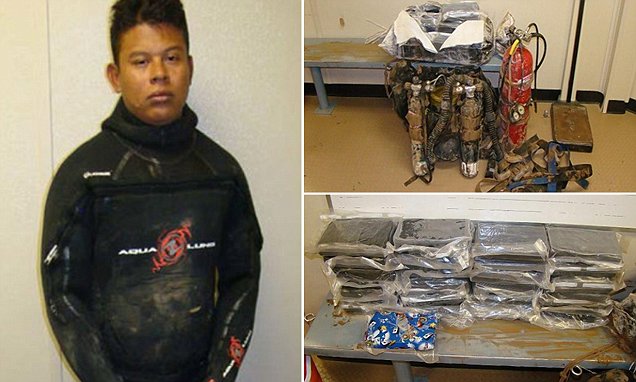Currently, the Mexico-United States border division exists in the form of strategically-placed barriers put in place as part of three large “operations” to reduce drug smuggling and illegal immigration. These are Operation Gatekeeper in California, Operation Hold-the-Line in Texas, and Operation Safeguard in Arizona. However, those within the U.S. political sphere have recently been talking about constructing a legitimate border wall between the United States and Mexico. Indeed, Republican presidential candidate Donald Trump even told Fox Business that were he to be elected, he would build a permanent and divisive wall called the Great Wall of Trump.
The question remains whether or not such a wall would really be completely effective. Drug smugglers have, in a literal sense, found ways around border control in the form of underwater tunnels.
Indeed, a Honduran man called Evelio Padilla-Zepeda, was intercepted by the feds near the All-American Canal in Calexico, California this April. According to the U.S. Attorney’s Office, he was wearing a soaked-through wetsuit and scuba gear, and was carrying 55 pounds of cocaine that he had smuggled through an underwater tunnel between Mexico and the United States. The scuba gear included two rebreather tanks that allowed him to stay concealed beneath the water, as they prevent air bubbles from surfacing. The cocaine was divided into 25 vacuum-sealed and gift-wrapped packages, and has been valued at a reported $1,774,400.
Earlier this month, Padilla-Zepeda pleaded guilty in federal court to possession of cocaine with intent to distribute, and faces a prison sentence of up to 20 years.
The tunnel begins at a house in Mexicali, Mexico, and ends in the Californian canal. Its exit is partially submerged and hidden behind rocks. In court, Padilla-Zepeda admitted that he was planning to use the scuba gear to transport the cocaine underwater to another area in the canal. He also informed authorities that he was initially told that he would be paid $7,000 to help transport three people across the canal, but was later informed that he would actually be smuggling cocaine instead of people. He said that he went through with job anyways because “there was no other option”.
U.S. attorney Laura Duffy commented: “Drug smugglers will try anything to move their product — even scuba diving in an underwater tunnel. The ingenuity of the smugglers is matched only by our determination to thwart it, as we have done in this case.”
The identities of those who have built and operate the tunnel are still unknown. Padilla-Zepeda’s sentencing is scheduled for December 7.






